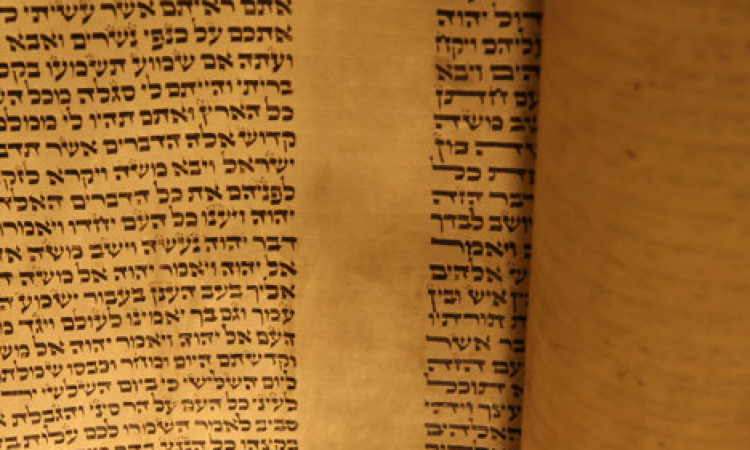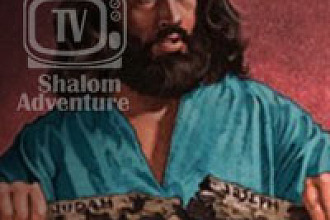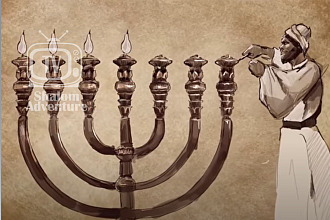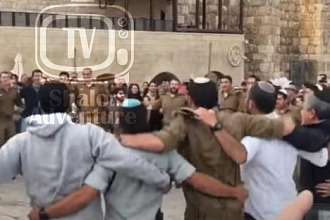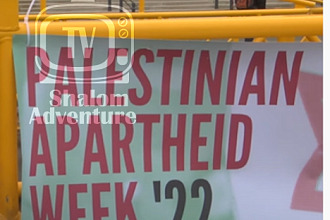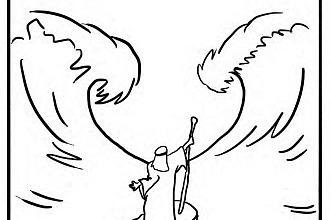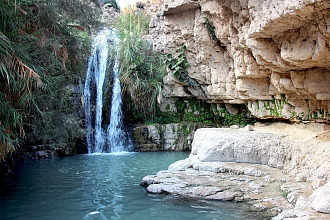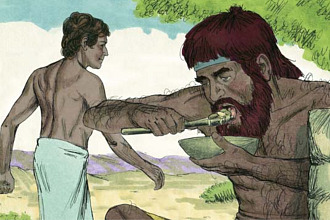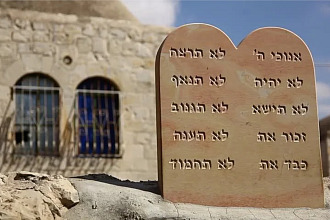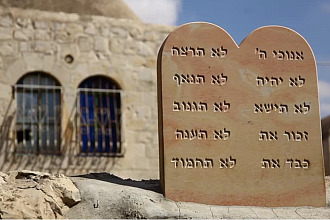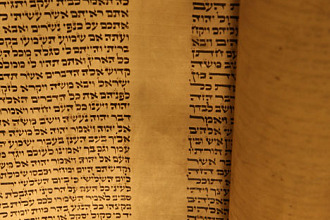Parasha for the Week: Tetzaveh: Exodus 27:20 – 30:10
Aftarah for the Week: Ezekial 43:10 - 27
Besorat Yeshua: Mark 15:16 - 27
Overview
G-d told the people to supply pure olive oil for the menorah in the Mishkan (Tent of Meeting).
He also told them to make bigdei kehuna (priestly garments): A breastplate, an ephod, a robe, a checkered tunic, a turban, a sash, a forehead-plate, and linen trousers. Upon their completion, Moshe is to perform a ceremony for seven days to consecrate Aharon and his sons.
This includes offering sacrifices, dressing Aharon and his sons in their respective garments, and anointing Aharon with oil. G-d commands that every morning and afternoon a sheep be offered on the altar in the Mishkan. This offering should be accompanied by a meal-offering and libations of wine and oil.
G-d commands that an altar for incense be built from acacia wood and covered with gold. Aharon and his descendants should burn incense on this altar every day.
"Judgement... on His Heart"
The Torah states regarding the Breastplate of Judgment, worn by the Kohen Gadol, High Priest, that, "...Aaron shall carry the judgment of the Children of Israel on his heart..." (Exodus 28:30). What is the meaning and implication of the phrase "on his heart"? Rabbi Aharon Levine, author of Hadrash Vehaiyun, elucidates: When a judge has to render a decision in a quarrel between two people, he cannot rely on the feelings of his heart. Following one's feelings can lead to a distortion of justice. When a wealthy person and a poor person are involved in a financial quarrel, one's feelings might be prejudiced in favor of the poor person. However, it is possible that the wealthy person is right and justice should be on his side. Therefore, the Torah states, "on his heart" to teach us "above his heart" -- one cannot decide by his feelings, but rather that law and justice must be the key deciding factors. Rabbi Packouz says: "while compassion and mercy are important, they are not always appropriate. One cannot pervert justice. If you want to help a poor person, do so at your own expense, not at the expense of someone else and not at the expense of justice."
"Beautiful and Holy Garments for the High Priest"
The Torah states: "And you shall make holy garments for Aharon your brother for honor and beauty. And you shall speak to the wise-hearted people in whom I have filled with the spirit of wisdom, and they shall make the garments for Aharon to sanctify him to be a priest to me. These are the garments that they shall make: a breastplate, an ephod (apron), a robe, a knitted tunic, a turban, and a belt. Make them as sacred garments for Aharon your brother and his sons so that they shall be priests to me"(Exodus 28:2-4).
This section begins with verse 2 saying that the purpose of the priestly garments was for honor and beauty, but Moshe was told to speak to the people who make the garments that they should have the intention that the garments were for sanctifying the priests and to serve the Almighty. Why didn't Moshe mention to them to make the garments beautiful?
Rabbi Yehuda Leib Bloch explained: The priestly garments had profound spiritual symbolism. They were to give the priests a special sanctity and relationship to the Almighty. For this reason they had to be made exactly as the Almighty commanded. It was not necessary that they should be beautiful in the eyes of man. However, human nature demands that something which has great importance should also be externally beautiful. That is the reason behind the Almighty wanting the garments to be for "honor and beauty" and therefore commanding Moshe to make them that way. Nevertheless, Moshe was instructed to only tell them to make the garments to sanctify and serve the Almighty. If they were to have in mind that the garments were to be beautiful in the eyes of other people, it would have taken away from their more elevated thoughts and made it with human beauty not heavenly beauty.
This has practical ramifications for us today. Though it is necessary to do some things for physical beauty, the main focus of a congregation should be on sanctity and spirituality.
"Spiritual Meaning of Burning and offering Incense"
"In the offering of incense the Levite was brought more directly into the presence of G-d than in any other act of the daily service. As the inner veil of the sanctuary did not extend to the top of the building, the glory of G-d, which was manifested above the mercy seat, was partially visible from the first apartment. When the Levite offered incense before the L-rd, he looked toward the ark; and as the cloud of incense arose, the divine glory descended upon the mercy seat and filled the most holy place, and often so filled both apartments that the priest was obliged to retire to the door of the tabernacle. As in that typical service the levite looked by faith to the mercy seat which he could not see, so the people of God are now to direct their prayers to the Messaih, their great High Priest, who, unseen by human vision, is pleading in their behalf in the sanctuary above." (PP, 353)
Jeremiah spoke about the Messiah when he said: The days are surely coming, says the L-RD, when I will raise up for David a righteous Branch, and he shall reign as king and deal wisely, and shall execute justice and righteousness in the land. In his days Judah will be saved and Israel will live in safety. And this is the name by which he will be called: "The LORD is our righteousness." (Jer. 23:5-6)
"The incense, ascending with the prayers of Israel, represents the merits and intercession of Messiah, His perfect righteousness, which through faith is imputed to His people, and which can alone make the worship of sinful beings acceptable to G-d. Before the veil of the most holy place was an altar of perpetual intercession, before the holy, an altar of continual atonement. By blood and by incense G-d was to be approached--symbols pointing to the great Mediator, through whom sinners may approach G-d, and through whom alone mercy and salvation can be granted to the repentant, believing soul." (PP, 353)
"Israel, a Fresh Olive"
The Prophet Jeremiah compares the people of Israel to an olive; "A fresh olive, a fruit of beautiful shape did G-d call your name" (Jeremiah 11:15). The seven candles of the Menorah, filled with the oil of the olive, represent the light we have to give to the world. Without the oil, God's Spirit in our hearts, no light is produced. The olive produces its oil only after being squeezed and pressed. Similarly, often our greatest times of "shining" come during our times when we are squeezed or tried by difficult circumstances.
Haftara: Ezekiel 43:10 – 27
Haftarah: Because the parasha describes the sanctuary and its service, the text chosen for the Haftara is about the sanctuary: "describe the Temple to the House of Israel, and let them measure its design. But let them be ashamed of their iniquities" Ezekiel 43:10.
Besorat Yeshua: Mark 15:16-27
Parasha: Moses continues to install the sanctuary and the priesthood of Aaron. "Have Aaron your brother brought to you from among the Israelites, along with his sons Nadab and Abihu, Eleazar and Ithamar, so they may serve me as priests. Make sacred garments for your brother Aaron, to give him dignity and honor. Tell all the skilled men to whom I have given wisdom in such matters that they are to make garments for Aaron, for his consecration, so he may serve me as priest. (Exodus 28:1-3)
Every element of the sanctuary applied to the Messiah The Messiah is King as "Son of David" (Mat.1:1) but he is also priest, not according to the Leviticus and Aaronic order but according to Melchizedek 'The LORD has sworn and will not change his mind: "You are a priest forever, in the order of Melchizedek." (Psa. 110:4)
Besorah: Roman solders took Y'shua to Golgotha. They don't understand who this man is. "They put a purple robe on him, then twisted together a crown of thorns and set it on him. And they began to call out to him, "Hail, king of the Jews!" Again and again they struck him on the head with a staff and spit on him. Falling on their knees, they paid homage to him. And when they had mocked him, they took off the purple robe and put his own clothes on him. Then they led him out to crucify him. " (Mark 15:17-20). It is important to notice that it is not the Jewish people who crucified Yeshua, but the Romans, the crucifixion has never been a Jewish way to put to death murders. "They crucified two robbers with him, one on his right and one on his left." (Mark 15:27). This is exactly what the Jewish prophet Isaiah wrote: "He was assigned a grave with the wicked... and was numbered with the transgressors." (Is. 53:9, 12)
Richard-Amram Elofer

